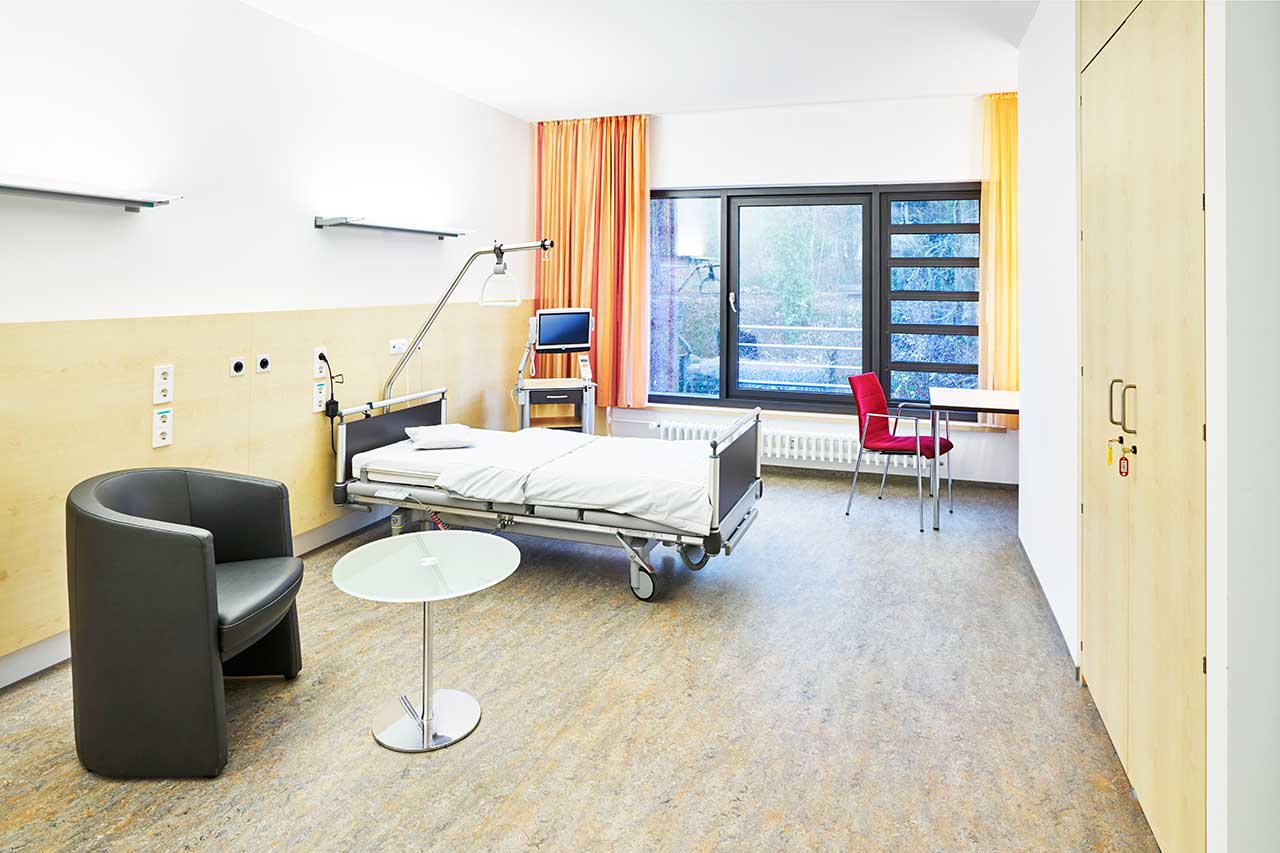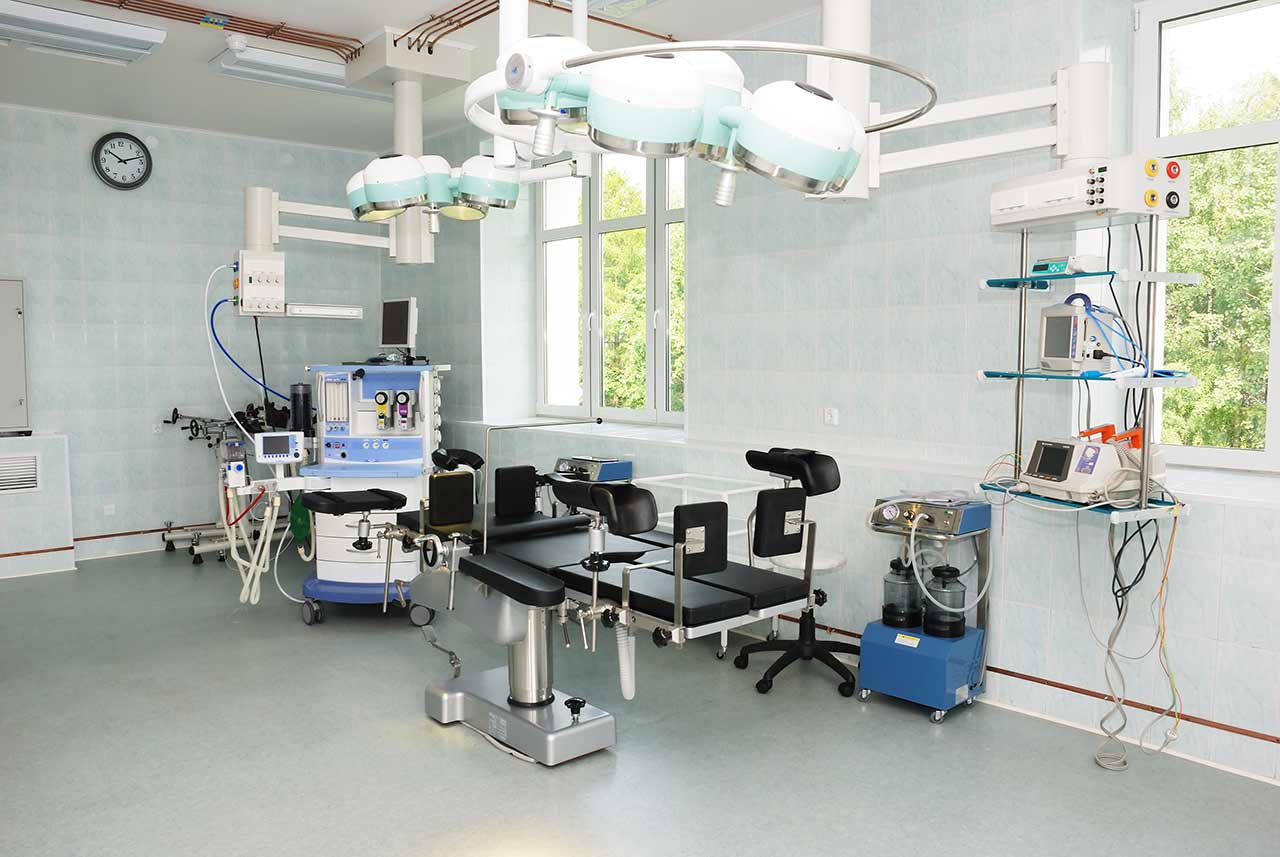
The program includes:
- Initial presentation in the clinic
- clinical history taking
- review of medical records
- physical examination
- laboratory tests:
- complete blood count
- general urine analysis
- biochemical analysis of blood
- inflammation indicators (CRP, ESR)
- indicators blood coagulation
- hormonal examination
- TSH, fT3, fT4
- thyroid ultrasound
- thyroid scintigraphy if indicated
- abdominal ultrasound
- treatment in the intensive care 5 days
- consultation of related specialists
- symptomatic specific treatment
- the cost of essential medicines and materials
- nursing services
- control examinations
- full hospital accommodation
- developing of further guidance
Required documents
- Medical records
Service
You may also book:
 BookingHealth Price from:
BookingHealth Price from:
About the department
The Department of Gastroenterology, Cardiology and Diabetology at the Vivantes Kaulsdorf Hospital specializes in diagnosis and treatment of a wide range of diseases including diseases of the gastrointestinal tract, liver, cardiovascular diseases and type 1 and type 2 diabetes. In 2013, German Diabetes Society awarded the department with a certificate of the Diabetes 1 and 2 types Treatment Center. The head of the department is Dr.
Hans-Ulrich Jahn.
The human digestive system consists of vital organs: the stomach, pancreas and intestines, which work 24/7 to filter out all vital components from food and make them available to the body. The liver removes dangerous substances from the blood and produces bile for digestion. If these organs stop working properly, the human body becomes very afflicted, so the task of the department's specialists is to diagnose and treat gastroenterological diseases.
One of the most important directions of the department is cardiology. Using the most modern methods of research, doctors diagnose all common cardiovascular diseases: circulatory disorders (coronary heart disease), heart attack, cardiac arrhythmia, heart valve diseases and heart failure. Depending on the individual need of the patient, the department uses "bloodless" (so-called non-invasive) methods, for example, ultrasound examination of the heart and, if necessary, also invasive but painless examination methods, for example, cardiac catheterization.
Another important area of the department is treatment of diabetes. There is an interdisciplinary team of doctors with an exceptional experience in the treatment of diabetes and metabolic processes of the body. A key consideration in therapy is the integrated approach to treatment. The basis for the treatment of metabolic disorders is nutrition counseling, which is carried out by highly qualified dietitians of the department. Additional focuses in this area include insulin pumps, care for pregnant women with diabetes (in collaboration with the Department of Gynecology and Obstetrics), and treatment of long-term effects of diabetes.
The department offers diagnosis and treatment in such areas:
Gastroenterology
- Endoscopic examination of the stomach and intestines under short-term anesthesia
- Endoscopic retrograde cholangiopancreatography (ERCP) of the bile duct and pancreas, for example, at suspicion of stones in the bile ducts
- Ultrasound examination of the digestive and vascular organs (duplex sonography of abdominal organs)
- 24-hour emergency service for endoscopic procedures, for example, in acute stomach bleeding
- Modern and gentle endoscopic methods for stopping bleeding
- Endoscopic therapy, which can replace surgical intervention: removal of polyps in the colon, removal of stones from the bile ducts, restoration of bile excretion in the pancreas (stenting)
- Installation of nutrient probes in the stomach and small intestine (PEG, PEJ)
- Identification of increased indices of liver function of unknown origin, collection of tissue samples from the liver with the ultrasound (puncture of the liver)
- Diagnosis of nutrition, for example, with unexplained chronic diarrhea and / or weight loss (laboratory examination for suspected vitamin deficiency)
- Consultations on nutrition
- Determining the status of food
- Food Intolerance Study
Cardiology
- Cardiac catheterization with balloon expansion (PTCA) and stenting
- ECG and ECG with load (ergometry)
- Long-term ECG (up to 60 hours)
- Implantation of cardiac monitors
- Daily monitoring of blood pressure
- Echocardiography (ultrasound of the heart) and stress echo
- Transesophageal echocardiography (TEE)
- Implantation of pacemakers and defibrillators and subsequent care
- Orthostatic test (inclined test) with syncope
- Doppler study of blood vessels (ultrasound)
- Spirometry (examination of lung function)
Diabetology
- Primary diagnosis of type 1 and 2 diabetes
- Treatment of metabolic imbalance in diabetics with and without insulin
- Individual adaptation to reinforced or conventional insulin therapy
- Treatment with insulin pumps
- Training in insulin delivery and blood glucose measurement
- Research and treatment of complications in diabetes
- Treatment of disorders of lipid metabolism, obesity
- Treatment of gout, including complications
- Learning lifestyle with hypertension, advice on nutrition in hypertension
Photo of the doctor: (c) Vivantes - Netzwerk für Gesundheit GmbH
About hospital
To ensure a high quality medical care, the Vivantes Kaulsdorf Hospital has 8 specialized departments and 426 beds. The hospital annually treats about 42,000 patients - 26,000 outpatients and 16,000 inpatients. In addition, more than 1,150 children are being delivered in the obstetrics ward every year.
The medical team of the hospital consists of 120 doctors and 330 employees of junior and middle medical personnel who take care of the health and well-being of their patients on a daily basis. The hospital is one of the main providers of medical services in the region.
The main medical directions of the hospital include general and abdominal surgery, orthopedics and traumatology, in particular the Endoprosthesis Center (EndoProthetikZentrum EPZ). The doctors of the hospital are experts in the field of internal medicine, cardiology, gastroenterology and geriatrics. The hospital also has a Diabetes Treatment Center (type 1 and type 2), which provides comprehensive treatment of diseases associated with diabetes. The center is certified by the German Society of Diabetology.
It should be noted that the medical institution is an academic clinic of the Charité University Hospital, therefore doctors working here take part in medical research and are engaged in research activities.
Photo: (c) depositphotos
Accommodation in hospital
Patients rooms
The Vivantes Kaulsdorf Hospital offers accommodation in comfortable rooms with all the necessary equipment. All patients have access to the WI-FI password, as well as headphones which allow them to watch TV or listen to the radio at any time. On the territory of the clinic there is a sports ground. In the building № 8 there is a cafeteria where patients enjoy delicious drinks and snacks and you can have a snack in the bistro in the building № 10.
Meals and Menus
The hospital has a restaurant, which offers balanced healthy courses. Upon request, patients can order food to their rooms.
Further details
Standard rooms include:




